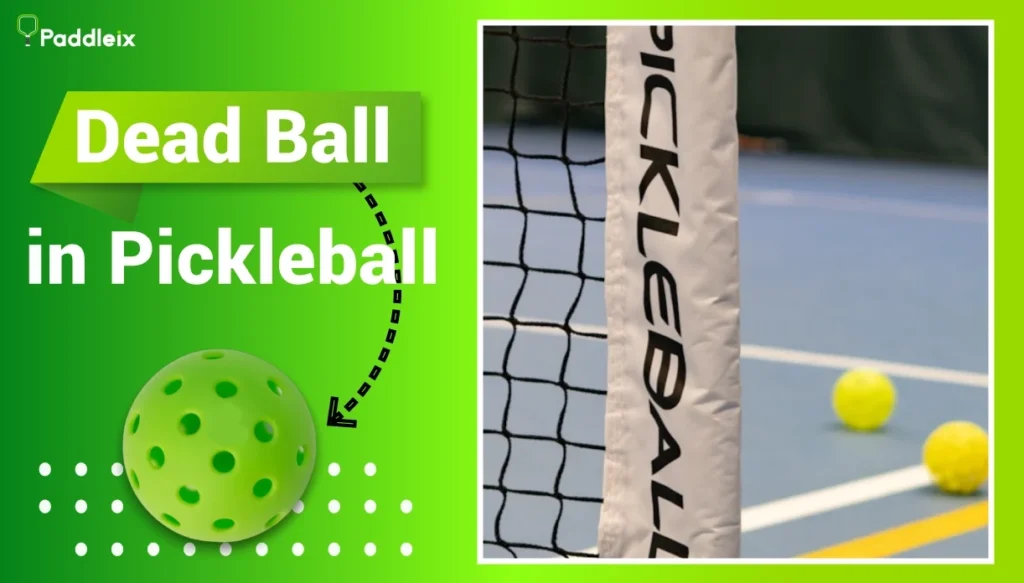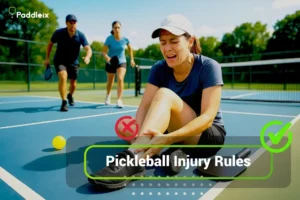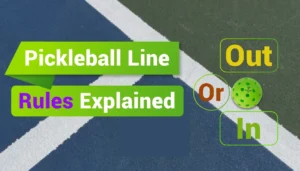Calling a dead ball means the rally is over, stopping the action on the court. In pickleball, when the ball goes out of play or a fault is committed, it’s our job as players to recognize it and call it.
A good dead ball call keeps the game fair, avoids unnecessary rallies, and helps everyone focus on strategy instead of debating close calls.
When I first started playing, there was this game where I didn’t realize I’d committed a fault at the kitchen line—totally zoned out! My opponent (a friend and seasoned player) pointed it out.
Not only did it end the rally, but it taught me to pay closer attention and be ready to make those calls myself.
Knowing these rules makes the game a smoother experience for everyone, and it’s great for building sportsmanship.
The Concept of a Dead Ball in Pickleball
Let’s start with the basics. A “dead ball” is any ball that is no longer in play, either because it’s landed out of bounds, hit the net, or a fault has been committed.
Once a dead ball call is made, that point is over, and players prepare for the next serve.
Calling a dead ball ensures we’re following the rules and keeps the pace up. Indoors, it’s even more important to keep a close eye since there are more potential obstacles—walls, lighting, and echoes all factor in.
Calling the ball accurately and quickly helps prevent confusion, arguments, and the dreaded “let’s re-do” debates.
Common Situations for Calling a Dead Ball in Indoor Pickleball
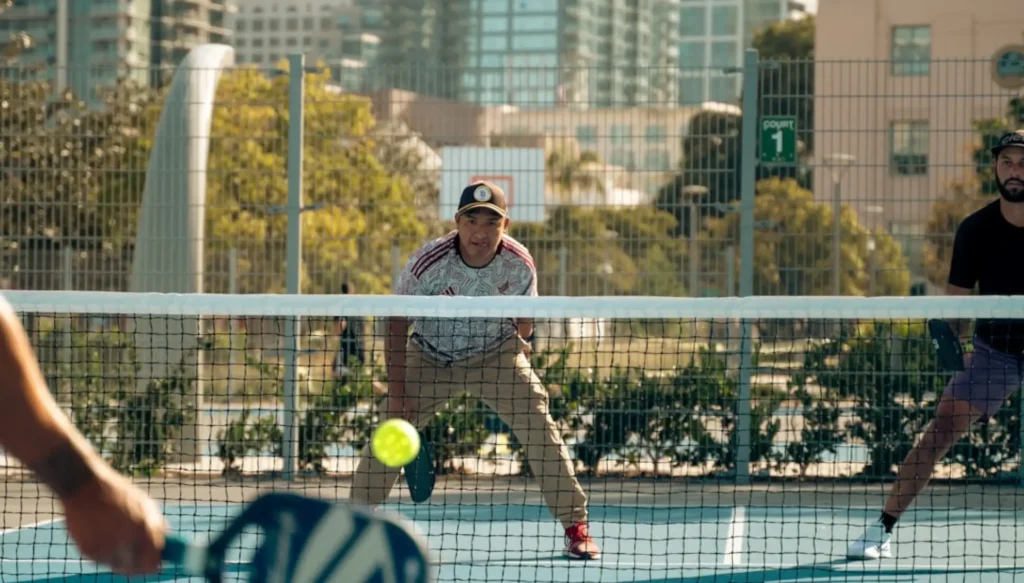
Here are some common scenarios where you might find yourself calling a dead ball in indoor pickleball.
1. Ball Hits the Net and Doesn’t Cross Over
If the ball hits the net and fails to make it over, it’s an instant dead ball. I’ve had a few games where I’ve hit the ball into the net, only for it to flop right back onto my side.
At that moment, I know it’s a dead ball, and it’s time to move on to the next point.
2. Out-of-Bounds Shots
Indoor pickleball courts usually have marked boundaries, but in smaller spaces, the walls or any contact with off-court areas counts as out.
If the ball touches anything outside the playing area—walls, floors, or ceilings—it’s a dead ball. I once watched a friend go for a shot that hit the back wall, and he kept playing, thinking it was still live. Lesson learned!
3. Foot Faults in the Non-Volley Zone (Kitchen)
Foot faults in the kitchen are another reason for a dead ball. If you step into the kitchen to volley, or cross the line after making contact, you’ve committed a fault, and the ball is dead.
Being mindful of foot placement is key, especially when there’s a lot of action around the net.
4. Double Bounce Rule
When someone lets the ball bounce twice on their side before hitting it, that’s an automatic dead ball. This is particularly common for beginners or in quick rallies where players can get caught off guard.
If you see it happen, calling “Dead ball!” right away helps keep things fair.
5. Interference from Outside Elements
It’s not uncommon to have other courts in play nearby. If another ball or player interrupts a point, it’s best to call a dead ball and replay.
We all want a fair match without unexpected distractions, so don’t hesitate to pause play if something out of your control interferes.
Who Can Call a Dead Ball?
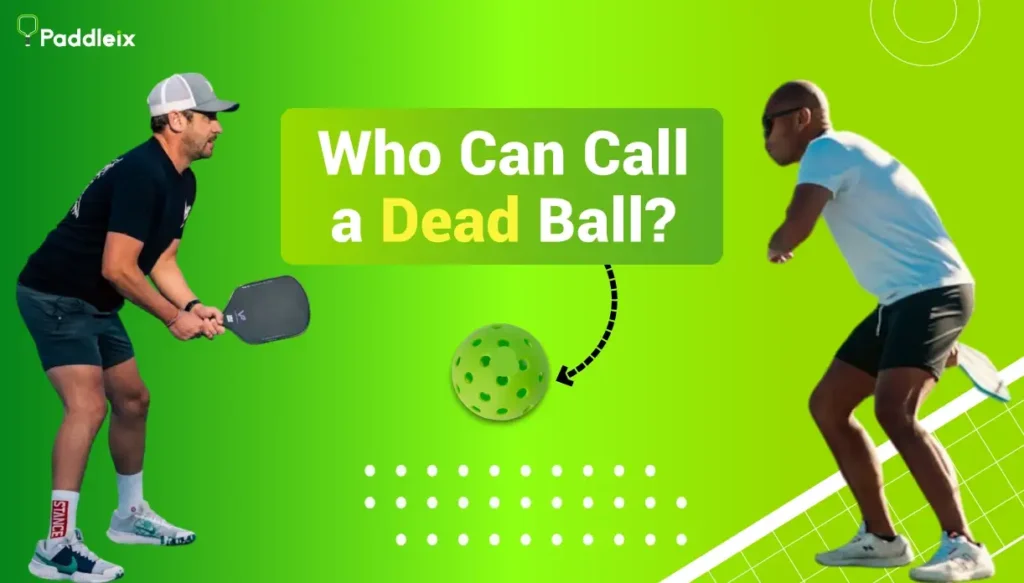
Knowing who should make the call is just as important as knowing when to make it. Here’s the rundown:
Self-Calls vs. Opponent Calls
Generally, players should call faults on themselves, especially for things like foot faults or double bounces. Self-calls promote fair play and make the game smoother.
In situations where an opponent commits a fault that’s easy to miss, like hitting the ball out of bounds, the other player can make the call.
Referee Calls in Competitive Play
In official tournaments or games with a referee, they’ll handle dead ball calls, particularly for foot faults and boundary issues.
But even in competitive play, players can assist by pointing out faults when there’s no ref nearby.
Friendly Play Guidelines
In friendly games, it’s about mutual respect. If you see that your opponent committed a fault, you can politely let them know.
Likewise, be open to honest feedback and call yourself on any faults you commit. It keeps the game enjoyable and respectful.
How to Make a Dead Ball Call Clearly and Fairly
Now, let’s talk about making the call itself. Knowing how to do it with clarity and respect can prevent a lot of misunderstandings.
Use Clear Language
When you need to make a dead ball call, say something like “Dead ball!” or “Out!” right away. Quick and straightforward words help everyone understand the point has ended, leaving no room for debate.
Body Language
If you’re in a noisy indoor court, raise your hand or paddle to signal the call visually. Body language helps reinforce your call, especially if your words get drowned out by background noise.
Timing Matters
Make the call immediately when you recognize the dead ball situation. The faster you can identify and call it, the more smoothly the game will flow.
Be Polite and Respectful
A dead ball call doesn’t need to be confrontational! Friendly, confident calls maintain good vibes on the court and show respect to everyone involved.
Tips for Avoiding Disputes Over Dead Ball Calls
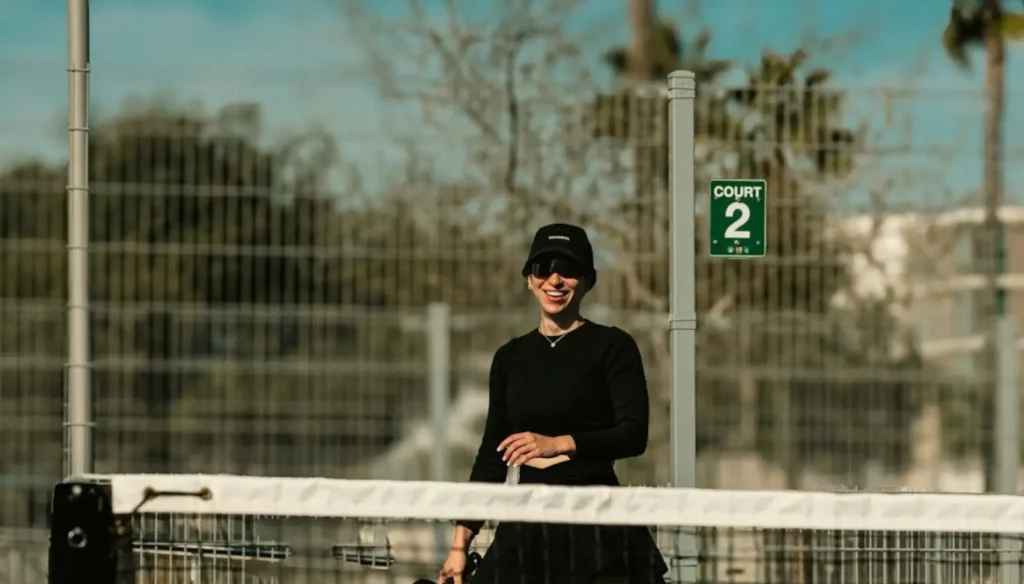
While we all aim to play fair, sometimes calls can be subjective. Here are a few tips to help avoid disputes:
Set Ground Rules Before Play
Before your match begins, take a moment to agree on dead ball rules with your opponents. It’s a great way to make sure everyone’s on the same page, especially in casual games.
Play with Integrity
Always call faults on yourself. It’s tempting to let small mistakes slide, but calling yourself out makes for a more enjoyable game for everyone.
Use “Let’s Replay” in Unclear Situations
If a dead ball call is unclear, suggesting a replay keeps things fair and stress-free. I’ve used this approach when calls get tricky or if there’s disagreement—it’s a win-win, and both sides appreciate it.
Practice Makes Perfect: Sharpening Your Eye for Dead Ball Calls
Making consistent dead ball calls is a skill, and practice helps sharpen it. Here’s how you can get better at it:
Practice Recognizing Dead Ball Situations
Observe potential dead ball situations in practice games. The more familiar you become, the easier it will be to call them out in real matches.
Get Feedback from Experienced Players
Ask experienced players for feedback on your calls or watch how they handle dead ball situations. You’ll pick up useful tips and build your confidence.
Mind the Indoor-Specific Challenges
Indoor courts come with unique challenges—like echoes, walls, or smaller spaces. Practice staying focused on these factors so you can confidently call a dead ball without second-guessing.
Dead Ball Call for Better in Pickleball
Calling a dead ball might seem like a minor part of the game, but it has a huge impact on fair play and game flow. Knowing the ins and outs of dead ball situations will make you a better player and a great teammate.
It’s all about clear, respectful calls that keep the game moving and fun for everyone.
So next time you’re on the court, keep an eye out for those dead ball moments, make the call confidently, and enjoy the game.
And remember, calling a dead ball is just another skill to add to your pickleball toolkit—one that shows you play with integrity, awareness, and a love for the game.
Top FAQs About Calling a Dead Ball in Pickleball
What is a dead ball in pickleball?
A dead ball is any ball that is out of play or ruled unplayable, ending the point immediately.
Can players call a dead ball on themselves?
Yes, players should call dead balls on themselves for faults like foot faults or letting the ball bounce twice.
How do I call a dead ball fairly?
Use clear language like “Dead ball!” or “Out!” and make the call immediately to avoid confusion.
How should I call a dead ball during a game?
To call a dead ball, use clear language like “Dead ball!” or “Out!” and signal with your hand if needed. The key is to make the call immediately to avoid confusion.
Can I call a dead ball if I see my opponent commit a fault?
Yes, especially in recreational play, it’s common courtesy to call faults like out-of-bounds shots or double bounces on your opponent’s side. Just make the call respectfully.
What are some common reasons for a dead ball call in indoor pickleball?
Common dead ball situations include the ball landing out of bounds, foot faults in the kitchen, double bounces, interference (like a stray ball from another court), and balls hitting the net without crossing over.
What should I do if there’s a disagreement over a dead ball call?
If you’re unsure or there’s a disagreement, the best solution is often to replay the point. This helps keep the game fair and prevents conflicts.
Do indoor settings affect dead ball calls?
Yes, in indoor pickleball, factors like walls, lower ceilings, and tighter spaces can create more dead ball situations. Make sure to pay attention to these indoor-specific elements for fair play.
Can we replay a point if there’s interference during play?
Absolutely! If there’s interference, like another ball rolling onto your court, call a dead ball and replay the point for safety and fairness.

